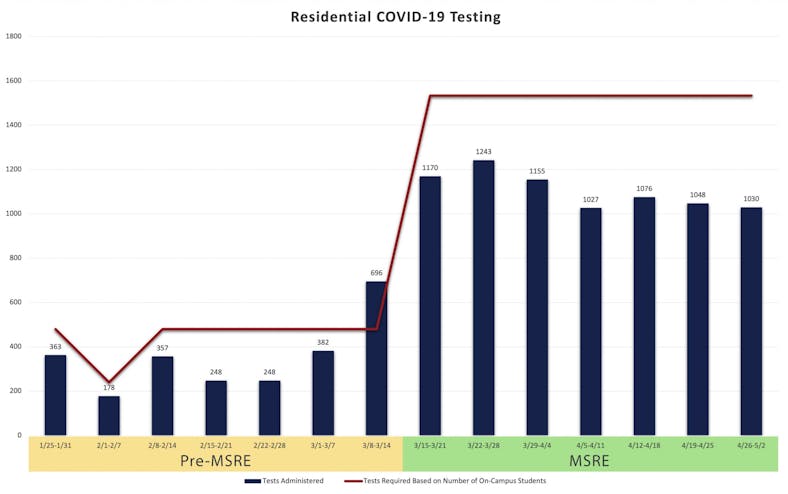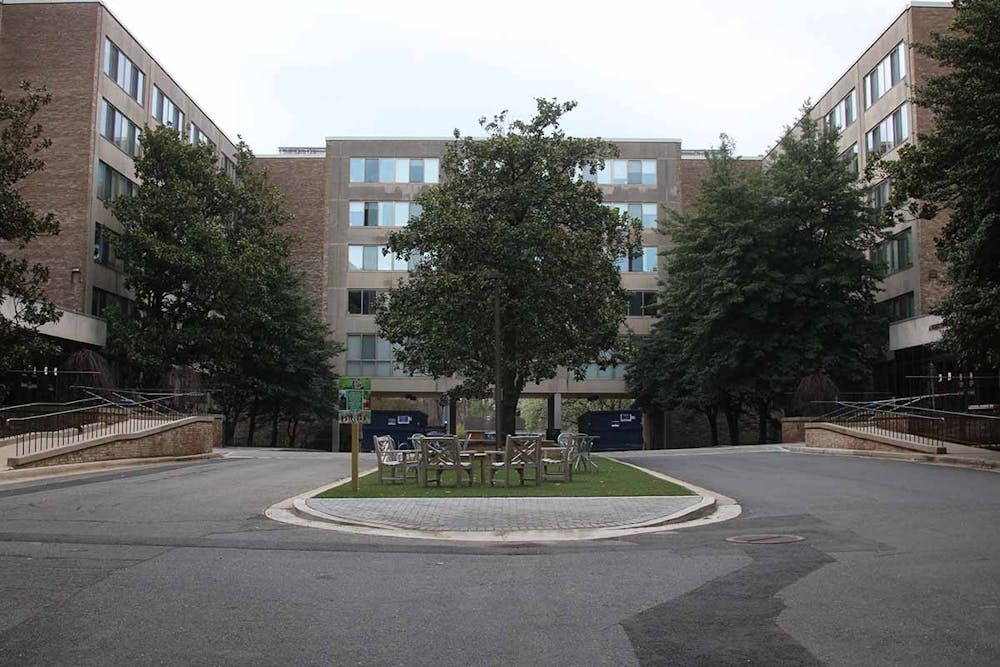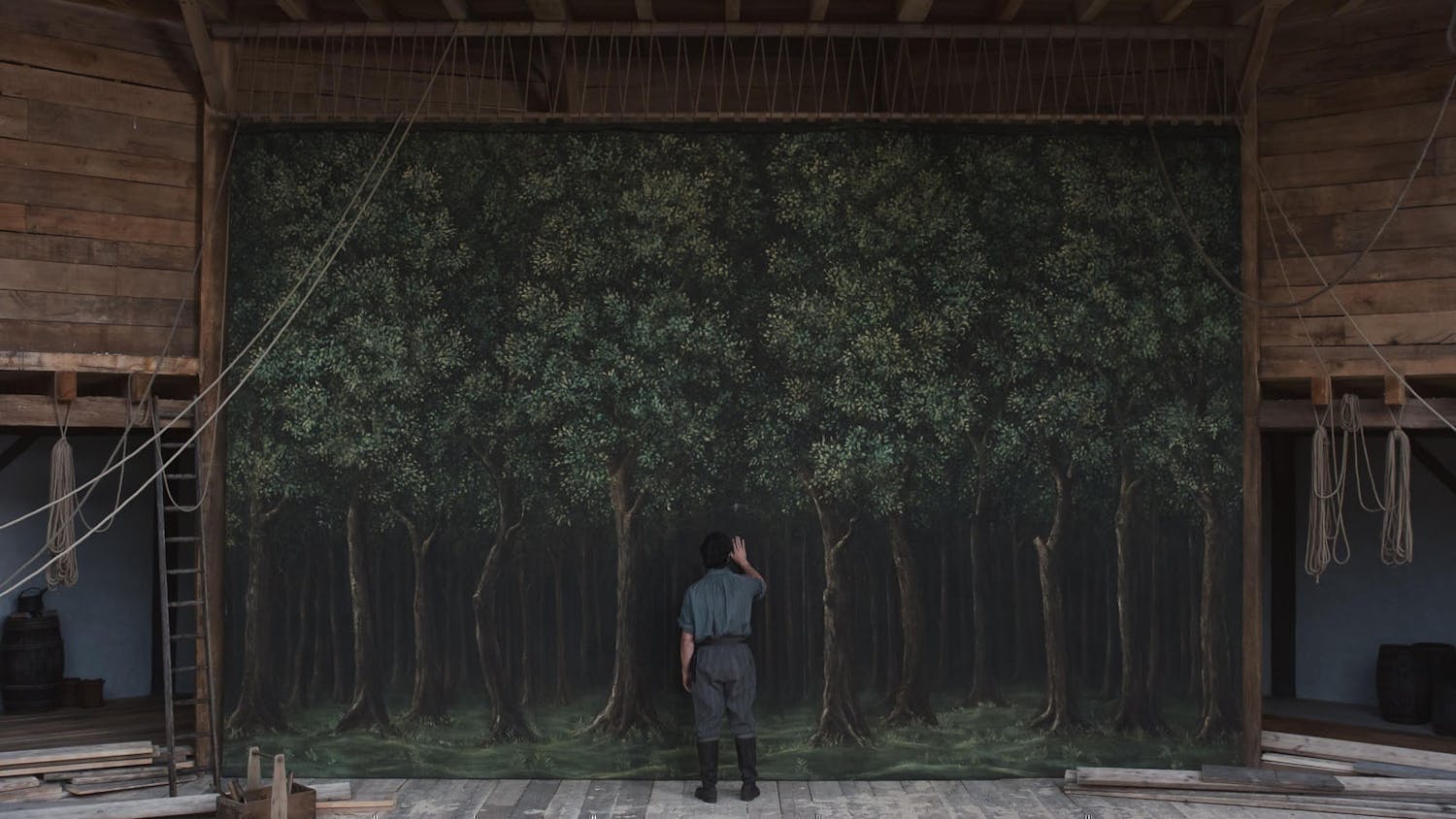American University has consistently under-tested its on-campus student population since doubling in-person classes and tripling the number of campus residents for the Mid-Semester Residential Experience that began in early March.
Although the University required the 767 individuals living on campus to get tested twice weekly, an Eagle analysis of publicly available data found that the goal has never been met, with approximately 300 to 500 tests going unadministered each week. Since the MSRE began on March 14, the University has administered an average of 1,055 tests a week to on-campus students.
Dr. David Reitman, the medical director of the Student Health Center, explained that 30 students who lived on campus were exempt from testing since they contracted the coronavirus in the past 90 days and an average of five to 10 students were traveling on any given week. Vaccinated students were still required to be tested, he said.
At most, that explains 80 of the missing weekly tests, leaving hundreds of tests unaccounted for.
Reitman couldn’t explain why so many tests were missing beyond students skipping one or both required tests in a week but said that the testing deficit didn’t concern him.
“Looking at the numbers, looking at how many students are being exempted from [testing] for one reason or another, this is probably along the lines of what we expected,” Reitman said. “I don’t think anyone is intentionally … trying to game the system and get out of getting a test.”
The University also failed to meet its testing requirement spring semester prior to the MSRE, when only 240 students were located on campus in emergency housing.
Reitman said that bringing students back to campus for the spring semester was a “learning curve” during which the University confronted unanticipated challenges like tracking traveling students and trying to get every student tested twice a week.
“I think it leaves us with room for improvement,” Reitman said. “We have a lot of lessons learned with regard to [bringing students back to campus] and it’s really set us up to be in a much stronger position for the fall.”

Students who repeatedly miss required testing can be sent to the conduct office, but University officials have repeatedly emphasized that the focus is on keeping the student body safe rather than “policing” them.
Despite AU’s testing deficiency, the University has managed to keep coronavirus cases low. When compared to Georgetown and George Washington Universities, AU has reported the lowest number of coronavirus cases both on campus and across the entire community.
The University’s low on-campus case count is likely due to less than half of the available 1,250 MSRE slots filling, bringing AU’s residential community to 767 students. Comparatively, Georgetown and George Washington each welcomed over 1,000 students to campus this spring.
A total of 25 on-campus cases have been reported by the University during the spring semester. One coronavirus cluster of four students was confirmed in emergency housing in March. Fanta Aw, the vice president of campus life and inclusive excellence, said that there were no other instances where three or more on-campus cases were connected.
In a statement to The Eagle, Aw credited the relatively low coronavirus caseload to the University teams that prioritized health and safety over the past year.
“From testing, to education, to contact of affiliates, and health and safety ambassadors, to the work of health center and residence life teams, we appreciate the partnership with our AU community,” Aw wrote. “We are looking forward to a fall term and applying the learning, collaboration and ongoing work on health and safety and achieving our core mission of teaching and learning.”
Aw added that vaccinations now occupy the University’s ongoing work in preparation for the fall semester.
Creating a safe residential experience
Students who spoke with The Eagle about their experience in emergency or MSRE housing were generally satisfied with how the University handled residential living, despite reports that health guidelines weren’t always strongly enforced.
Shira Cohen, a freshman who lived in a D.C. hotel during the fall semester, said that she found on-campus living to be safer and more socially gratifying. During her fall semester stay at the Marriott Residence Inn, a series of COVID-19 cases forced her to self-isolate.
“It wasn’t good, just being cooped up in a hotel room, not really knowing what to do or who has COVID who doesn’t,” Cohen said. “I’d rather be in an environment where it’s much more controlled and I don’t have to worry as much about who’s getting COVID-19.”
Cohen described her MSRE experience as “amazing” and said that since moving into Anderson Hall, she’s enjoyed making new friends, getting outside more and petting Wonk Cat.
Though a current copy of the residential assistant handbook obtained by The Eagle contained no reference to COVID-19, Lisa Freeman, the director of residence life, said that RAs were given separate materials about health and safety based on existing national policies.
“These are not guidelines that are specific to the residence halls,” Freeman said. “Wearing a mask, social distancing, that’s the University’s requirements for health and safety for any of its community members, me included.”
Tyler Moore, a resident assistant in Anderson Hall, previously told The Eagle that her residents were so spread out over the floor that being present for them in any capacity was challenging. Freeman said that RA living locations were designated before any students were placed. She was unsure whether room assignments were given to students based on their proximity to an RA.
Freeman explained that residential staff were not tasked with policing students and said it’s the responsibility of the community to enforce the University’s expectations and guidelines, not vice versa.
Re-opening campus to the public
With a larger number of students living on campus and D.C. loosening its coronavirus restrictions, AU resumed modified campus tours in late January.
Tours are now conducted entirely outside and are capped at 30 people who must wear masks and socially distance the entire time, Director of Public Affairs Stacie Burgess said. Visitors must complete a COVID-19 symptom self-assessment but are not required to show proof of a negative test or vaccination card.
AU Ambassador Ames Jewart, a junior who’s been volunteering with the program for three years, is happy that tours are running again.
“We really wanted to make sure that we were able to welcome those prospective students and families to help them make their decision,” Jewart said. “Obviously it’s different, but I think we’re doing the absolute best we can.”
A few tour leaders have removed individuals for refusing to wear a mask, but visitors have otherwise respected health guidelines, Jewart said.
Freshman Jehane Djedjro, who lives on campus, said she’s appreciated seeing a diverse range of people touring campus during the MSRE but said that the number of visitors letting themselves into buildings can be distracting.
“Now with finals coming up, if I’m being completely honest, there’s not too much private space to really study without visitors walking by,” Djedjro said.
Though she wishes the University would have limited the number of tours during finals week, Djedjro said she’s enjoyed her time on campus so much that she’ll be staying over the summer.
Most students have left campus since the MSRE ended on May 5, but Djedjro is transitioning into a new job with the University’s guest services. After recently getting her first vaccine shot, Djedjro hopes to recharge after a long year and prepare for a very different fall semester.





